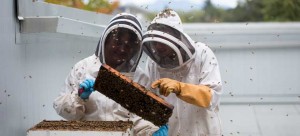University of British Columbia students have developed a probiotic for honey bees, which they’ve coined the ‘pro-bee-otic.’
This innovative study by a group of UBC students is regarding the development a probiotic for honey bees. This is a particularly important solution, as global bee declines are a major problem and so much of the food we eat depends on pollination by insects.
The students want to address this important issue and they feel that betting probiotics could be the key to protecting bees from death caused by harmful pesticides.
Pesticide used on crops is widely suspected as a major contributor to the failing bee populations.
Many people take probiotics to increase the number of “good bacteria” in their digestive system. The students have identified a species of bacteria that lives only in the gut of honeybees. They are trying to genetically engineer the bacteria to break down neonicotinoids, a type of pesticide that has been linked to bee death and is thought to contribute to colony collapse disorder.
They want to alter the genes in bees so that it helps break down neonicotinoids ingested by its host bee. “Neonicotinoids are the most widely used pesticides because it harms insects but not mammals like people.
Bee die-offs and the use of neonicotinoids have been in the spotlight recently.
The research is in early stage but it works, it could be a good solution to protecting bees and breaking down environmental toxins.
Students are working with bacteria known as Gilliamella apicola and their biggest challenge is to turn it into a “probeeotic” that helps bees break down the toxic chemicals in pesticides.
It is a difficult process because there is not much research on the bacteria they are working with and they are trying different ways to get the genes into the bacteria.
If they are successful, commercial beekeepers could one day mix the bacteria into a sucrose-water solution kept near the hives.
The bees would ingest the bacteria and take it back to their hives where they would pass it on to the other bees in the colony when they regurgitate food or through social activities like cleaning.
Just last week, a U.S. court overturned the Environmental Protection Agency’s approval of a type of neonicotinoid called sulfoxaflor because of its potential risk to bees.
For more information please visit: www.ubc.ca

